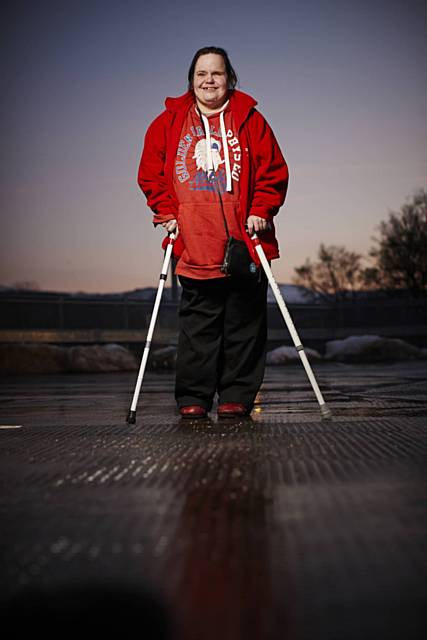Disabled people in the North West are being cut off from society warns disability charity
Date published: 09 March 2015

Hayley Reed
Many disabled people in the North West face being cut off from society and having to overcome major barriers to make and sustain friendships, a new report from disability charity Sense warns.
Research commissioned by Sense shows that almost 2 in 3 (64%) of people with disabilities in the North West feel they face greater barriers than non-disabled people in making and sustaining friendships. While nearly 1 in 4 disabled people (22 %) say they feel lonely on a typical day.
More than one in four (28%) people with disabilities also said that the Government’s recent changes to welfare benefits and eligibility for social care have made it harder for them to make and sustain friendships.
Sense, which supports and campaigns for people who are deafblind, is today (9 March) launching a new campaign “We all need friends” to highlight how opportunities for friendship remain elusive for too many people with disabilities. It will also explore the obstacles such as a shortage of appropriate services, transport, a lack of social groups and communication barriers and aims to open up a debate about what can be done to overcome them.
Hayley Reed, has had a hearing problem since the age of 10 and lost her sight 12 years ago. She has also been a wheelchair user for 24 years.
She says: “As a younger person friendship is a really important issue for me but it’s awfully hard to make friends. I see friends once a month which helps but sometimes you might have had a bad day and just want to talk to somebody. When you’ve got a disability, it’s just not that easy.”
Hayley, 45, receives 18 and a half hours of social care support each week, however, that only covers the minimum of getting dressed and preparing food.
“My direct payments don’t pay for support at night so I do find it very isolating. If we got more support for social type activities then it might be easier. That would be a big help.”
“I’ve got a physical disability as well as the sight and hearing loss but the sensory impairments take over from the physical as they’re very isolating. When you’ve got all three, it puts another barrier up.”
Sense Deputy Chief Executive Richard Kramer said: “Friendships are among the most valuable relationships we have and are important for people’s health and well-being. While there has been extensive analysis around loneliness and older people as their circle of friends reduce over time, our work shows that many disabled people have very few opportunities to make friends in the first place. People with disabilities are deeply worried about the lack of opportunities and the barriers to friendship whether it’s communication issues, a lack of transport or social groups to join. So far, there has been little analysis of the subject of friendship, particularly for young people and adults with disabilities.
“We want to start a national debate looking at the obstacles and what can be done to overcome them. Disabled people need to be visible, be allowed to play a full part in society and be given the same opportunities to make friends as everyone else.”
Do you have a story for us?
Let us know by emailing news@rochdaleonline.co.uk
All contact will be treated in confidence.
Most Viewed News Stories
- 1Castleton station ‘to become epicentre of huge change and growth’
- 2'Eyesore’ land in the town centre will become home to new apartment block
- 3Roadworks, temporary road closures and restrictions
- 4How life has changed on a notorious, crime-ridden estate shut off to outsiders
- 5Young refugee honoured with prestigious cricket award
To contact the Rochdale Online news desk, email news@rochdaleonline.co.uk or visit our news submission page.
To get the latest news on your desktop or mobile, follow Rochdale Online on Twitter and Facebook.

